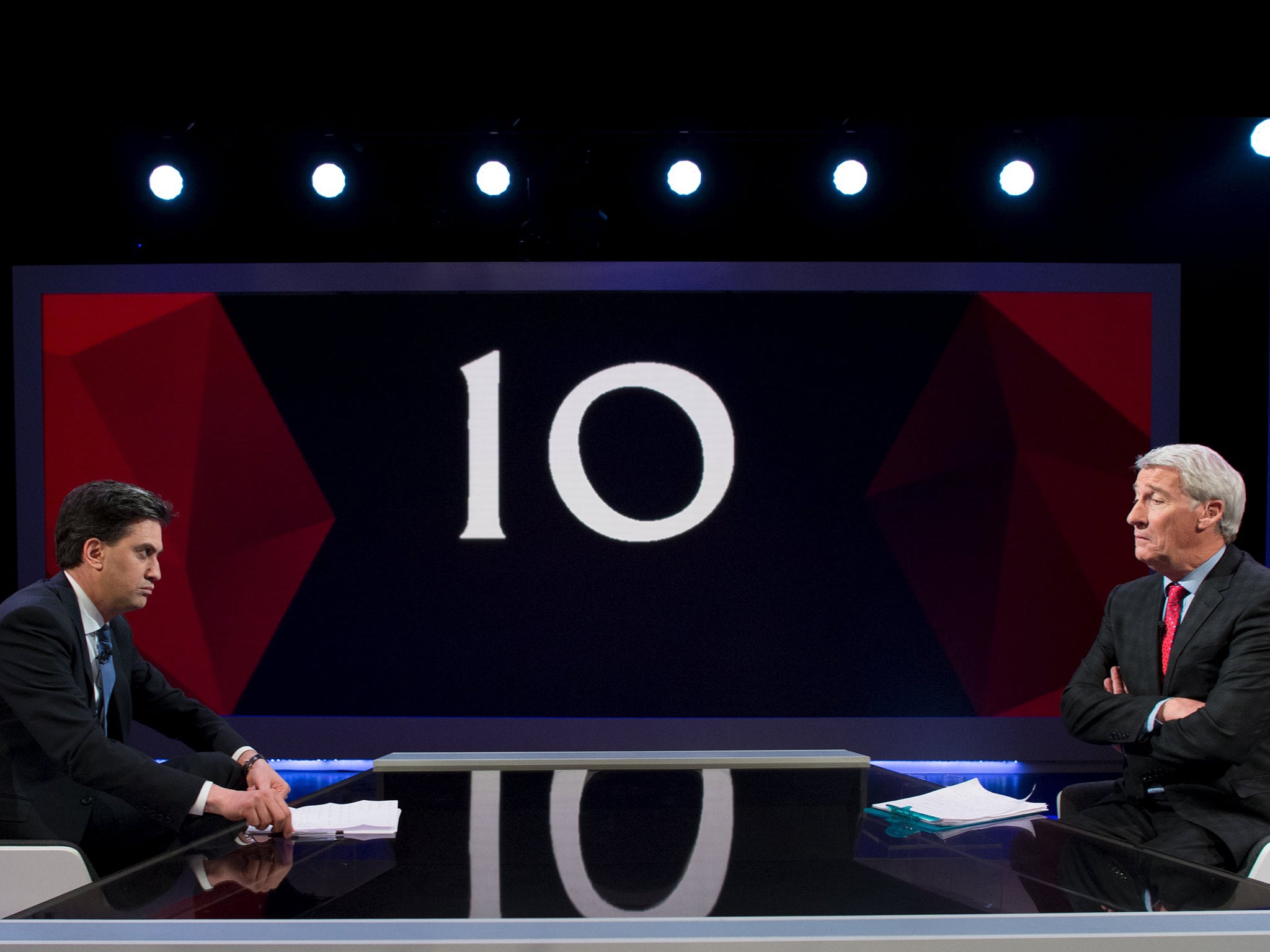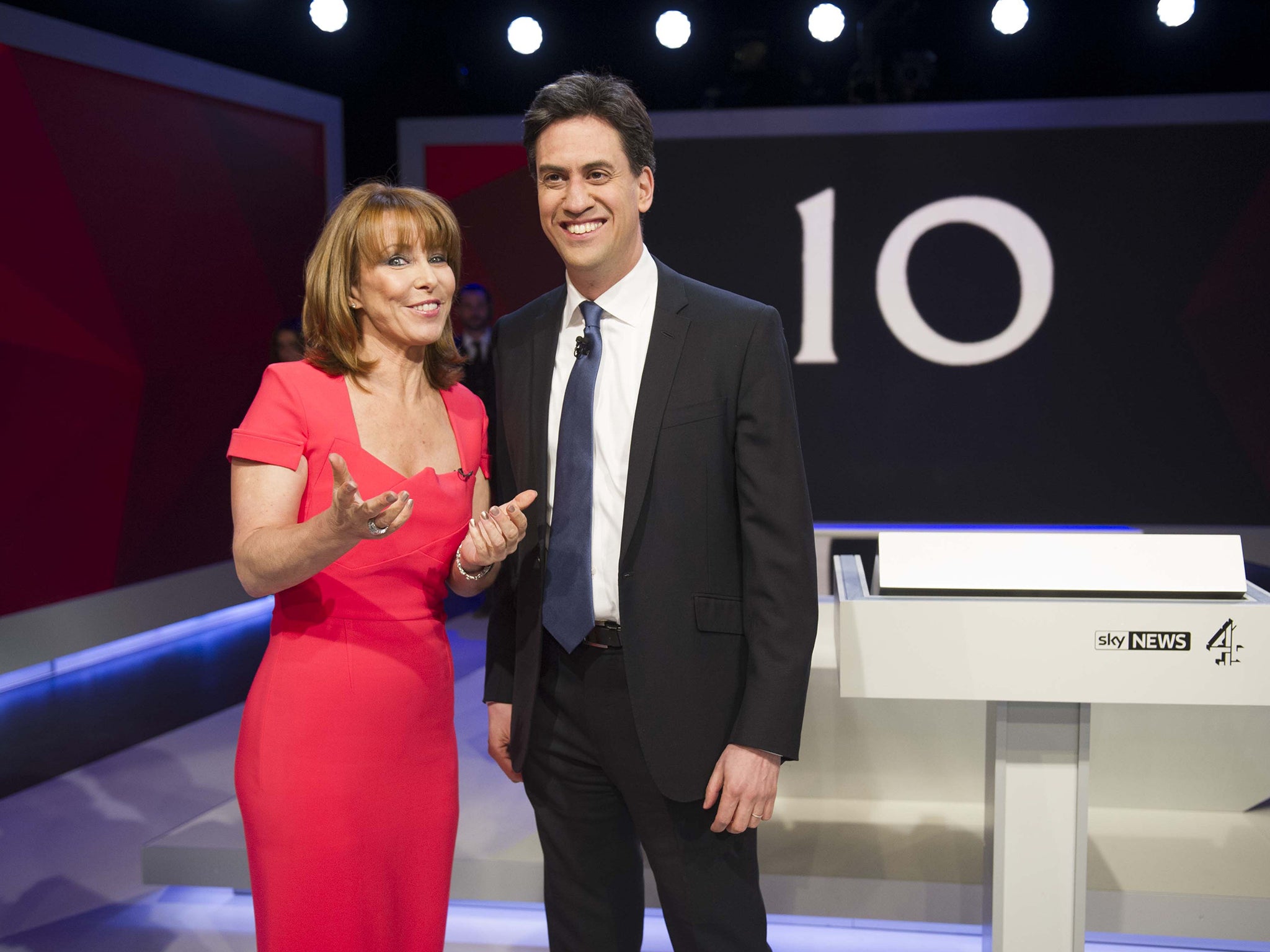TV debates: If Miliband can see off Paxman, maybe he can do the same to Cameron
Watching Thursday night’s performances, Steve Richards was struck by the Labour leader’s sense of liberation

Your support helps us to tell the story
From reproductive rights to climate change to Big Tech, The Independent is on the ground when the story is developing. Whether it's investigating the financials of Elon Musk's pro-Trump PAC or producing our latest documentary, 'The A Word', which shines a light on the American women fighting for reproductive rights, we know how important it is to parse out the facts from the messaging.
At such a critical moment in US history, we need reporters on the ground. Your donation allows us to keep sending journalists to speak to both sides of the story.
The Independent is trusted by Americans across the entire political spectrum. And unlike many other quality news outlets, we choose not to lock Americans out of our reporting and analysis with paywalls. We believe quality journalism should be available to everyone, paid for by those who can afford it.
Your support makes all the difference.Did David Cameron or Ed Miliband win the battle of the TV interviews? The conflicting answers to the question following the live event on Thursday night prove we all choose to see what we wish to see, or what we think we should be seeing.
Instant polls suggested that Cameron was the victor. But Miliband and his entourage are genuinely upbeat, more so than they have been for some time. Are they choosing to see what they wish to see, too?
I do not believe they are deceiving themselves, for several reasons.
Without exception, opposition leaders and their exhausted advisers feel a genuine sense of liberation when an election campaign finally begins. Campaigns are physically exhausting with moments of nerve-shredding intensity. But in terms of leadership they are more straightforward than the normal insane demands of opposition.
Once a campaign begins, the tough policy decisions have all been taken. A party unites and is disciplined. Questions about a leader’s future cease until the vote.
On Thursday, Ed Miliband became the latest Leader of the Opposition to feel and convey that sense of liberation.

On one level the event was the most daunting he has faced. At the start of a make-or-break election he was live, facing Jeremy Paxman and questions from an audience. Yet he seemed up for it, finally in the campaign and no longer burdened by the other agonising contortions of opposition.
Oddly Miliband performed less well in front of the audience and was good when challenged by Paxman.
Normally in a Q and A with an audience Miliband is relaxed, conversational, addressing each questioner by their name. On Thursday he answered the first questions by stepping forward and making a mini speech, slightly hectoring, awkward and jarring. But when he got in to his stride he deployed humour and was more relaxed.
With Paxman he managed to engage thoughtfully and wittily, wrong-footing an interviewer who prefers evasive defensiveness so he can to go in for the kill.
In contrast, David Cameron was ill at ease. On the whole, Cameron has enjoyed an easy media ride. He has faced three Labour leaders at points in their career when they were deeply unpopular. Most columnists largely share Cameron’s political outlook. He has avoided many probing interviews. But an easy ride means a leader can be ill prepared when the ride suddenly gets tougher.
Cameron is very good at tonal variety, smartly emollient and witty when delivering tough Thatcherite messages. He had no space for tonal variety under the Paxman interrogation. As a result he looked uneasy because, I suspect, he felt uneasy – self aware enough to realise the exchange was not going well.
Revealingly, he was thrown by opening questions about the number of food banks in the UK. In his preparation for the interview I suspect that food banks did not come up. They are not on his radar as he fights a more orthodox Thatcherite campaign arguing for a smaller state and cuts in welfare spending and tax.
Miliband’s confidence will have been boosted by his first experience of a live national TV election event. I believe this will be the most important consequence of the programme, perhaps the only one.
Miliband emerged feeling energised rather than downcast. He genuinely seemed to almost enjoy the event. If he had flopped, the next few weeks would seem even more daunting. Instead he is on a bit of a high. The mood at the formal launch of Labour’s campaign yesterday was tangibly more hopeful than it might have been.
When Miliband is feeling low, his public appearances can seem awkwardly defensive. But positive or defensive, performance in an election is of limited significance. Neil Kinnock fought the better campaign in 1987 and was heavily defeated in the election. At the start of the 1983 election campaign even Michael Foot felt suddenly, fleetingly optimistic, liberated from his nightmarish pre-campaign pressures. He too was slaughtered when the votes were cast.
Of much greater importance is the policy division between parties and the degree to which one party can unite voters on either the left or the right – how much one leader in his or her values more closely reflects the mood of the times.
Early confidence in the minds of leaders and their advisers is important, however. Even if most viewers saw a different debate on Thursday to the one that Miliband’s close allies saw, it is Miliband and his close allies who feel they won.
Although relieved by the instant polls, I suspect Cameron and his advisers know he did not perform especially well. They saw what they saw.
Miliband looks ahead to the first full week of the campaign with cause to feel upbeat.
Join our commenting forum
Join thought-provoking conversations, follow other Independent readers and see their replies
Comments